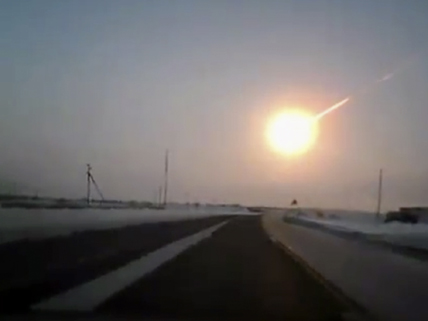The meteorite explosion over Chelyabinsk is captured by a driver’s dashcam.
On February 15, east of Russia’s Ural Mountains, the morning sky was lit up by a streaking meteorite. The space rock exploded in the atmosphere with dazzling brightness and with such sonic force that more than 1,200 people on the ground were injured near the city of Chelyabinsk, about 100 miles from the Kazakhstan border. Thanks to the dashboard cameras of many Russians in the area, numerous videos of the explosion were instantly available on the Internet.
The blast, which detonated 12–15 miles above ground, was estimated by NASA scientists as equal to more than 30 Hiroshima-sized atomic bombs. It generated a shock wave that blew out windows and knocked down walls, causing a billion rubles’ worth of damage. Scientists have recovered dozens of small fragments of the meteorite. The largest piece no doubt lies at the bottom of Chebarkul Lake, where it came to rest.
The Chelyabinsk meteor event was the largest strike recorded on Earth in over a century. The last major impact also hit Russia. It was far more devastating, though no one was hurt. Known as the Tunguska event, the meteor scorched and flattened millions of trees in remotest Siberia in June 1908. Estimated to have been about 100 meters across, it was far larger than the Chelyabinsk meteorite but left no impact crater.
According to astronomers, millions of meteors the size of the one that exploded over Chelyabinsk may be found in the “inner” solar system (the area from the asteroid belt to the Sun). Too many and too small to be detected by current technology, they only become visible if they pass through Earth’s atmosphere (burning up as “shooting stars”). NASA scientists are tracking near-Earth asteroids (NEAs), especially those with a diameter of 1,000 meters or more. One such NEA, named 2012 DA14, “brushed” by Earth on the same day as the Chelyabinsk meteor event, coming closer than the Moon.
Image credit: © AP Photo/Nasha gazeta, www.ng.kz
Related Links
- Russian Scientists Recover Meteor Fragments
This article recounts scientists’ efforts to find fallout from the Russian meteor explosion.
(Source: Associated Press, February 18, 2013) - Meteor Falls in Russia’s Chelyabinsk Region
View this photo gallery of images of the meteorite and areas damaged by it.
(Source: Washington Post, February 15, 2013) - Could Another Chelyabinsk-Scale Meteor Sneak Up on Us?
This blog puts the significance of the Chelyabinsk meteor incident in scientific perspective.
(Source: Scientific American, February 20, 2013) - Russia’s Other Meteor Explosions
Russia has seen other meteor explosions, one that was far larger than February’s over Chelyabinsk.
(Source: History News Network, February 15, 2013) - Russian meteorite: Not the First Strange Event in the Skies of Siberia
This article discusses the largest “meteor event” in recent times, which also occurred in Russia; includes an interview with Surendra Verma, author of The Tunguska Fireball: Solving One of the Great Mysteries of the 20th Century (2005).
(Source: Christian Science Monitor, February 20, 2013)





This can use for make current event for my homework and WOAH!!!!!!!
so cool I looked more of it up on the weather channel and i saw cool pictures
i saw alot of vidios on you tube, it waz so bright!
I saw many videos, too. I was surprised that the glass broke…
thiis is azmazingxxstnsze
It was sad, I hope nobody died
Anyone doing this for Ms. Peters? :3
this is cool, it did not hit russia
wow that was cool jk
I don’t understand why it took over 7 hours to come up with a bnkuer blowing up. News travels fast. So with everyone being rattled as they were last night. It took them over 7 hours to know some at a military camp at that blew up. Last night on the news it sd no one could find smoke or anything. And we r suppose to be believe something that big blew up and we didn’t know. They sd what people say must have been the explosion lights reflecting from a cloud or something? People r CrAzY I kno but why do I feel like there is stuff they aren’t saying. I don’t believe in UFO’s. but something is not right about this…..
some people in russia thout that we were going to war
I saw the video I’m shocked
I hope everyone is okay and is doing well.
Although this was very interesting and I enjoyed reading it
wow
i might seem really scary and BE scary for those who actually saw the meteor, but i think its awesome and really rare!